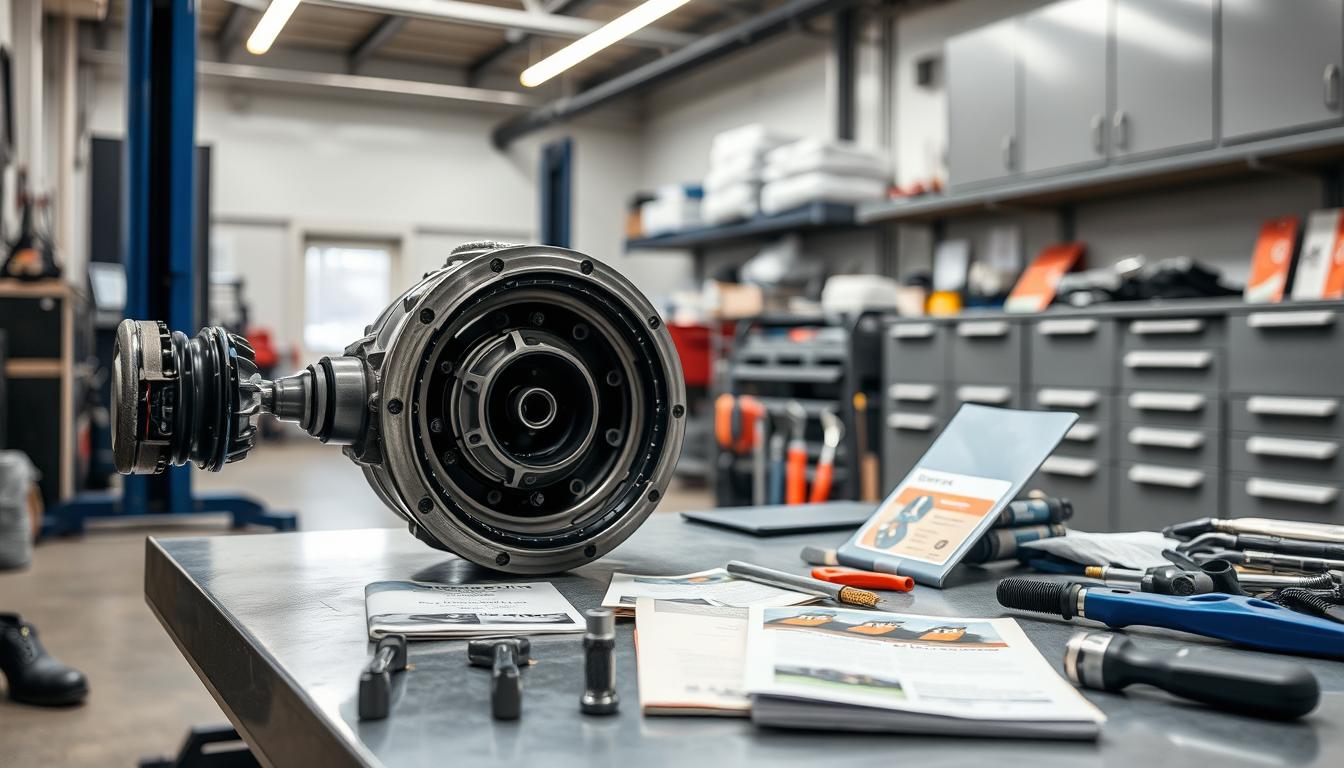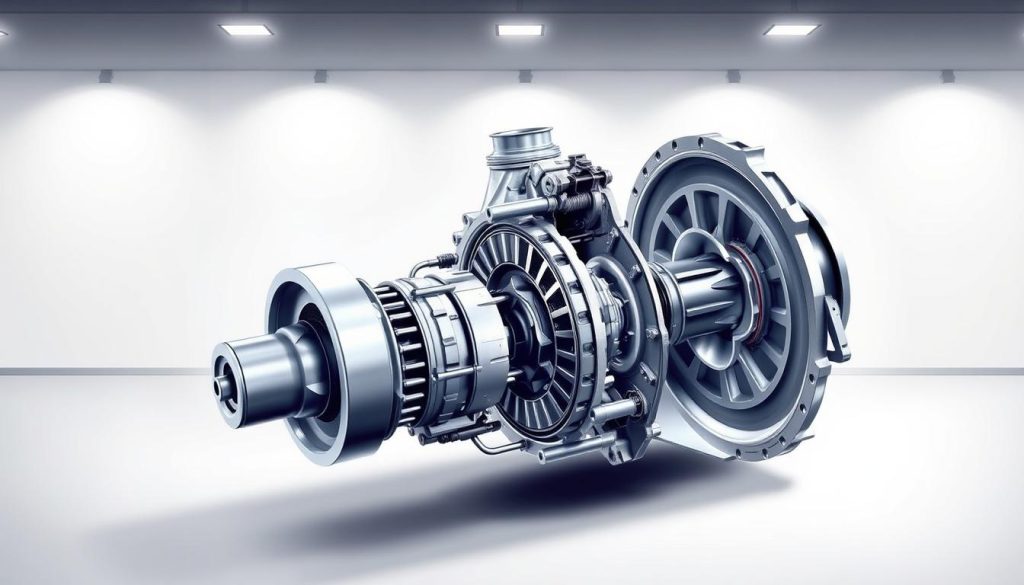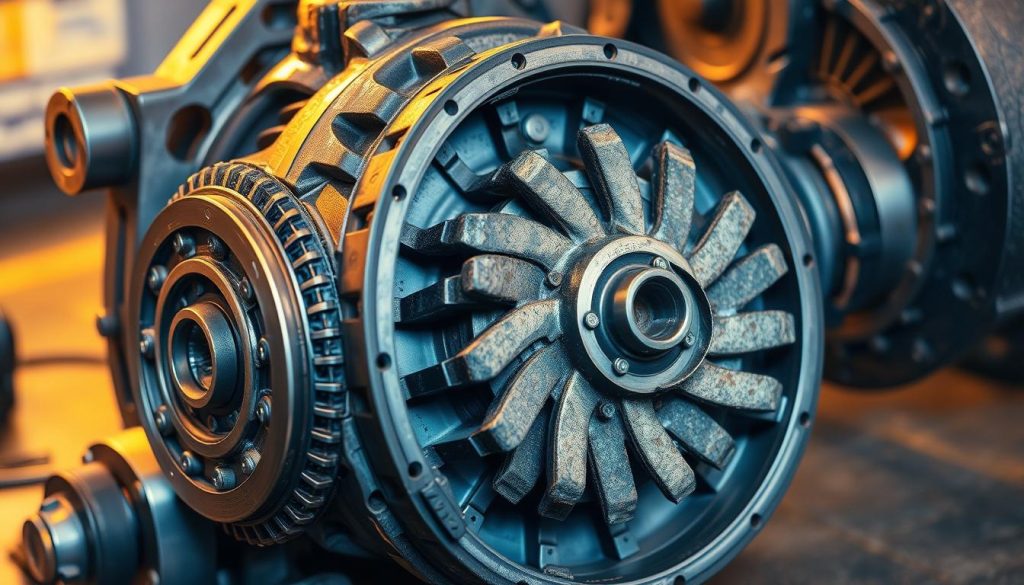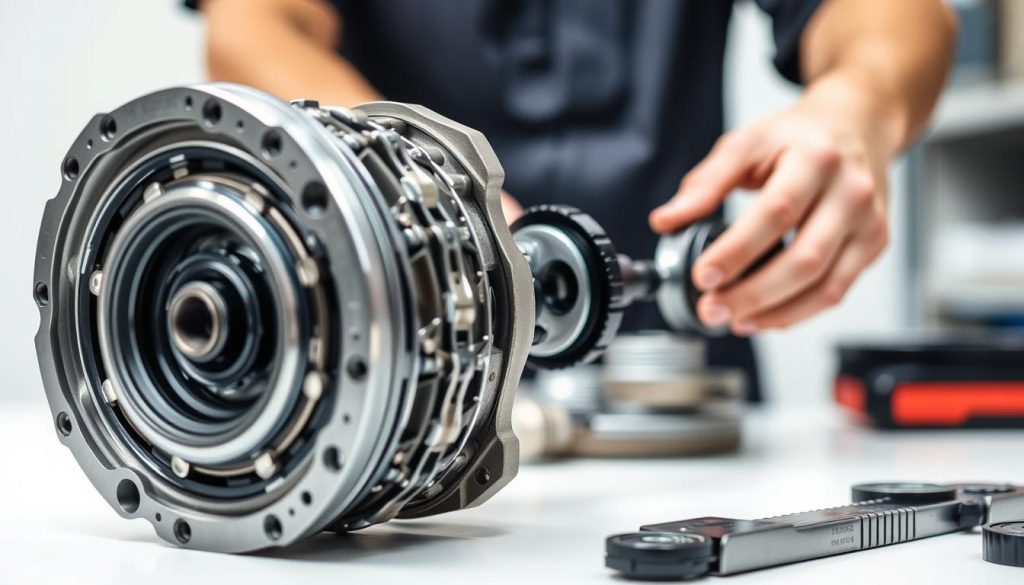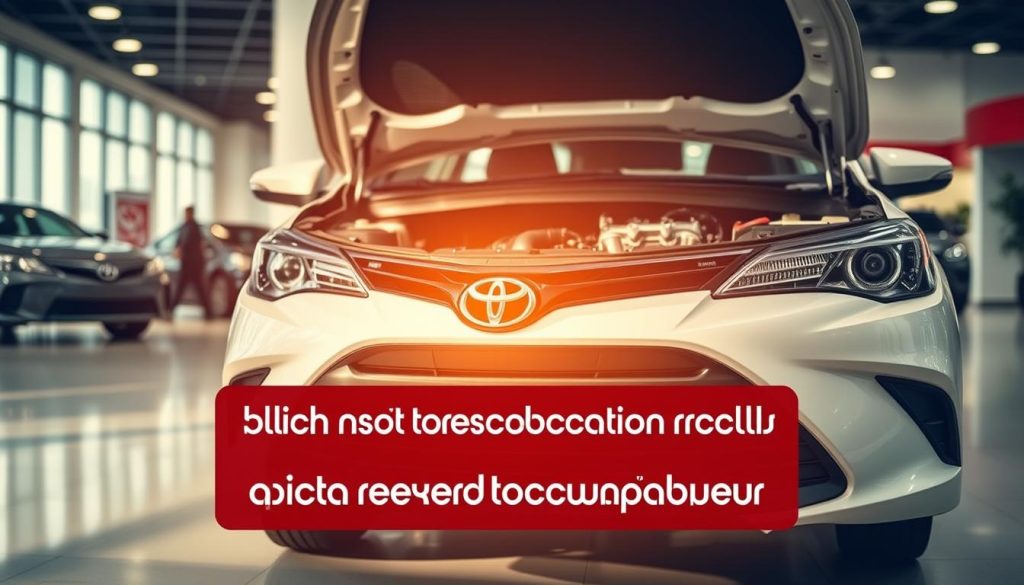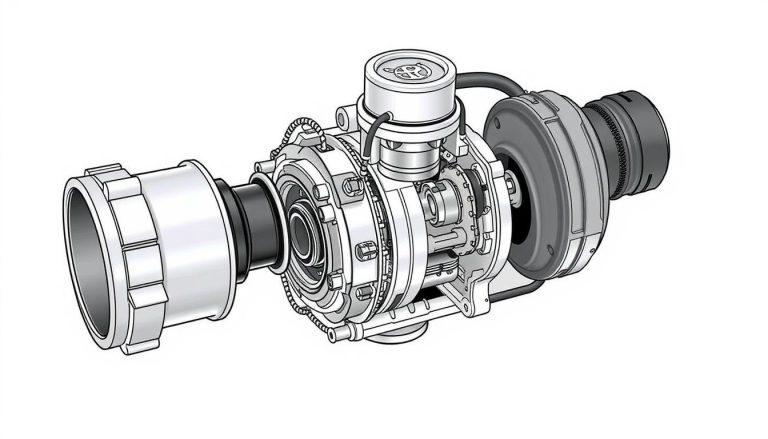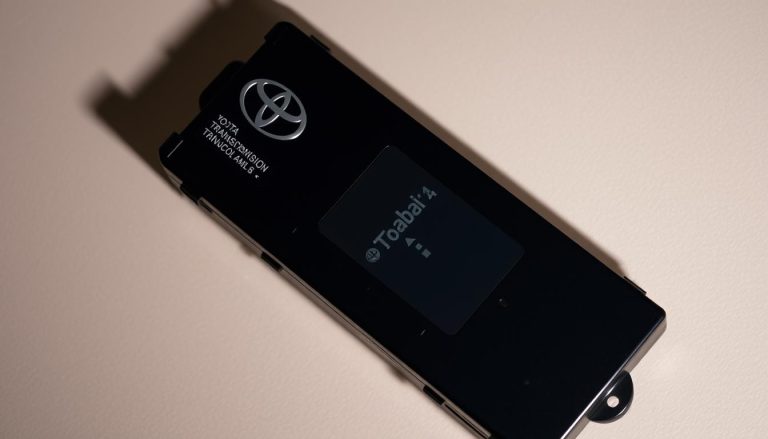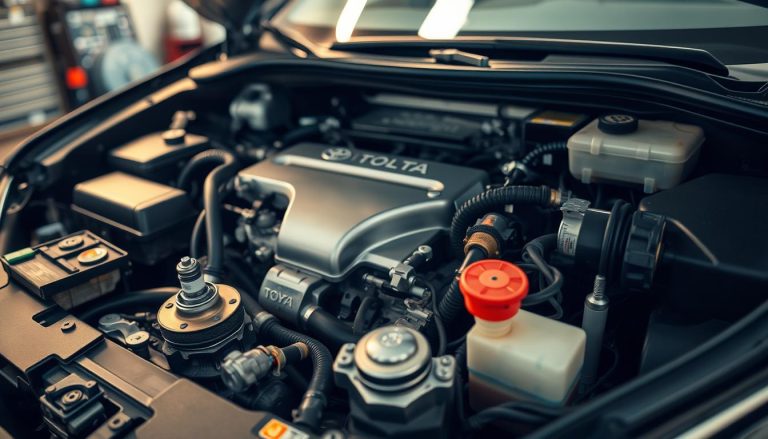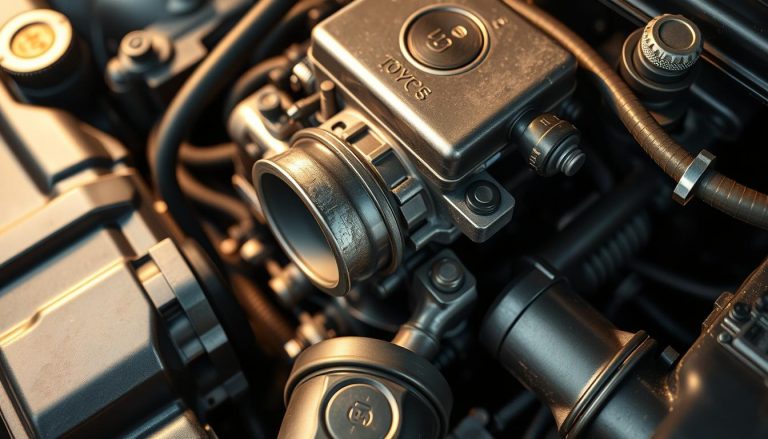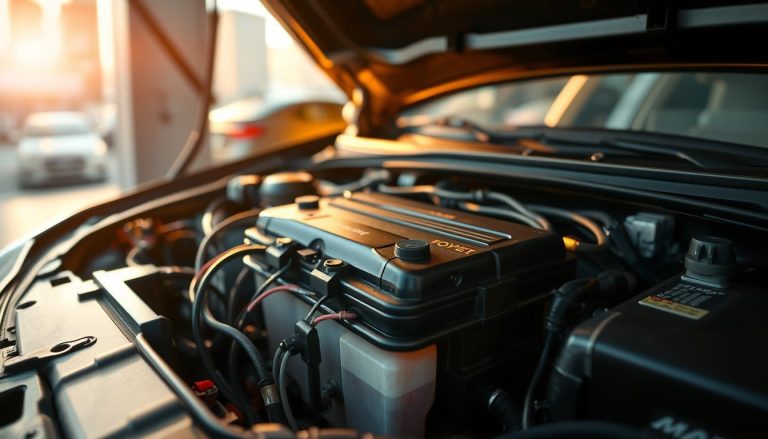Toyota Torque Converter Issues & Solutions
The torque converter is key to your Toyota’s smooth running. It helps power move from the engine to the transmission. But, it can face problems over time. This article will cover common torque converter issues in Toyota cars, symptoms, and Toyota torque converter repair options to keep your car running well.
Spotting problems early is vital. Fixing Toyota torque converter issues quickly can avoid big damage. This guide will teach you how to spot symptoms, diagnose problems, and find Toyota torque converter repair options.
Understanding the Role of a Torque Converter in Toyota Vehicles
A torque converter is key for Toyota’s automatic transmissions to work well. It connects the engine to the transmission, allowing power to flow. Knowing how it works helps fix problems and makes it last longer.
What is a Torque Converter?
A torque converter is a part of automatic transmissions. It uses hydraulic fluid to smoothly transfer engine power. This lets the car’s power output change easily and smoothly.
How Does It Work in Toyota Cars?
Toyota’s torque converter has three main parts: the pump, turbine, and stator. The engine’s crankshaft powers the pump, which moves hydraulic fluid to the turbine. The turbine spins, connected to the transmission, thanks to the fluid. The stator helps the fluid flow, making the system more efficient.
Importance in Automatic Transmissions
The torque converter is vital for Toyota’s automatic transmissions. It makes gear shifts smooth and efficient, without a manual clutch. It also helps manage engine load and improves fuel efficiency. Knowing its role helps fix problems and keeps the car running well.
Common Symptoms of a Failing Torque Converter
Knowing the signs of a failing torque converter in Toyota vehicles is key for keeping your car running well. Spotting these signs early can stop big problems with your car’s transmission. Here are the main signs to look out for.
Gears Slippage
Gear slippage is a clear sign of a torque converter problem in Toyotas. If your car suddenly shifts gears or can’t stay in the right gear, it’s a red flag. Gears should change smoothly; any odd shift or pause can really affect how your car drives.
Acceleration Loss
Another big symptom is when your car’s acceleration drops. If the converter isn’t working right, it can’t move power from the engine to the transmission well. This means your car won’t speed up when you press the gas pedal, which is risky, as you might need to speed up fast.
Rough Idling
Rough idling is also a common sign of a torque converter issue in Toyotas. If your car idles roughly, even when it’s in neutral or park, it might be a sign of a problem. These signs often show up as vibrations or a shaking feeling, meaning the torque converter isn’t working right.
Toyota Torque Converter Problems: Causes and Effects
It’s important to know why torque converter problems happen in Toyota cars. High mileage is a big reason. As cars get older, parts wear out, making them less effective.
Too much heat is another big problem. It can damage the inside parts or ruin the fluid. When checking for torque converter issues, heat damage is a key thing to look at.
Dirty transmission fluid is also a common problem. It stops the converter from working right, making the car run poorly. Finding dirt and metal in the fluid means there might be bigger mechanical issues.
| Cause | Effect |
|---|---|
| High mileage | Wear and tear, decreased efficiency |
| Overheating | Warped components, fluid breakdown |
| Contaminated transmission fluid | Impaired functionality, possible mechanical failure |
Not fixing these problems can really hurt your car’s performance. You might notice the car slipping gears, losing power, or acting strangely. Catching torque converter issues early can save your car from serious damage and expensive fixes.
Diagnosing Torque Converter Problems in Toyota Vehicles
It’s important to diagnose torque converter problems in Toyota vehicles to keep them running well. Here are some effective ways to find issues early.
Visual Inspection Techniques
Start by looking for fluid leaks around the transmission. Check the color and consistency of the transmission fluid. If it’s dark or burnt, it could mean internal damage.
Conducting a Stall Test
A stall test is a hands-on way to check for torque converter problems. Here’s how to do it:
- Warm up the engine and transmission to operating temperature.
- Engage the parking brake firmly and place the transmission in “Drive”.
- Press the brake pedal fully and gradually press the throttle pedal to open the throttle wide.
- Observe the tachometer and note the RPM where it stalls. A significantly lower or higher stall RPM can indicate a torque converter problem.
Using a Pressure Gauge Test
A pressure gauge test lets you measure the transmission’s hydraulic pressure. Here’s how to do it:
- Attach the pressure gauge to the designated test port on the transmission.
- Start the engine and let it idle.
- Shift through various gears while observing the gauge readings.
- Compare the readings to the specifications provided in the service manual. Inconsistent or abnormal pressures might signal torque converter issues.
Using these methods can help find problems early. This can save you from expensive repairs.
Signs of a Failing Torque Converter in Toyota Vehicles
Early signs of a failing torque converter in Toyota vehicles are subtle but important. You might hear clicking or whining sounds when shifting gears. Also, vibrations or shuddering can happen during acceleration or steady driving.
Knowing what does a torque converter shudder feel like is key to spotting problems early. This shuddering feels like a brief power loss or a jerk, mainly when starting from a stop. A slow response when shifting from park to drive or reverse is another sign.
Watching for these signs is critical for troubleshooting Toyota torque converter issues before they get worse. These symptoms can get worse over time, leading to costly repairs. A sudden drop in fuel efficiency is also a sign of a problem.
| Symptom | Possible Issue |
|---|---|
| Unusual Noises | Torque Converter Wear |
| Shuddering/Vibrations | Loss of Power During Acceleration |
| Delayed Response | Torque Converter Failure |
| Decreased Fuel Efficiency | Increased Energy Loss |
How to Fix Torque Converter Problems in Toyota Vehicles
Fixing torque converter issues in your Toyota can make your car run better and last longer. It’s important to know how to check for problems and when to get help. This guide will show you how to check the transmission fluid, consider a flush, and when to see a mechanic.
Transmission Fluid Inspection
Checking the transmission fluid is a key step in fixing torque converter problems. Use the dipstick to check the fluid level and color. If the level is low or the fluid is dark, it might mean your torque converter is not working right. Keeping the fluid at the right level can help avoid many transmission problems.
Complete Transmission Flush
If the transmission fluid looks dirty or is the wrong color, you might need a flush. A flush gets rid of old, dirty fluid and puts in new, clean one. This helps the torque converter work better and can fix many issues.
When to Consult a Mechanic
Some car problems you can fix yourself, but others need a pro. If your car slips gears, makes strange noises, or idles rough, it’s time to see a mechanic. A certified mechanic can find and fix the problem, keeping your car in good shape.
Troubleshooting Toyota Torque Converter Issues
Fixing torque converter problems in Toyota vehicles starts with checking the transmission fluid. If it’s dark or dirty, it might mean there’s a bigger issue inside. A full transmission flush could help with small problems.
Then, do a stall test. This involves checking engine RPMs in drive with the brakes on. If the RPMs are not steady, it could mean the torque converter is broken.
Use a pressure gauge to check the hydraulic pressure in the transmission. Low pressure could mean the torque converter is not working right. Also, look for leaks or damage with your eyes. These are key steps in fixing Toyota torque converter issues.
Fixing torque converter problems in Toyota vehicles needs these detailed steps. If you’re not sure, always ask a certified mechanic. They can help keep your car running well for a long time.
Symptoms of a Bad Torque Converter in Toyotas
Spotting torque converter problems in Toyota cars can be tricky. But, knowing the signs can help you fix issues before they get worse. Here are the common symptoms of a failing torque converter and how they show up:
1. Slipping Gears: You might notice your car slipping out of gear. This happens when the torque converter doesn’t engage right. It causes weird shifting or gear drops.
2. Loss of Acceleration: A bad torque converter can make your car hard to accelerate. If your Toyota takes too long to speed up, it might be the torque converter’s fault.
3. Shuddering or Shaking: Shuddering, often at low speeds or when loaded, is another sign. It feels like the car is shaking too much, showing torque converter problems.
4. Overheating: Torque converter issues can make the transmission overheat. If your car’s temperature gauge goes up or you get a warning, check the torque converter.
5. Strange Noises: Grinding, whining, or clunking sounds from the transmission area can mean a bad torque converter. These noises come from worn-out parts inside the converter.
Spotting these common symptoms of a failing torque converter early can prevent expensive repairs. If you notice any of these signs, get a mechanic to check it out.
Common Issues with Toyota Torque Converters
Toyota torque converters can face problems due to wear and tear or defects. Overheating is a common issue that can lead to early failure. This usually happens when the transmission fluid is low or of poor quality. Keeping the fluid levels right and changing it regularly helps avoid these problems.
Another issue is when the transmission fluid gets contaminated. This can cause debris to clog the torque converter. Such contamination can make the vehicle run less efficiently.
Mechanical issues, like faulty bearings, can also cause torque converter failure. You might hear clicking or grinding sounds when the car is stationary but in gear. Also, if the components are misaligned or the turbine fins are damaged, the torque converter won’t work well.
- Overheating due to low fluid levels
- Contamination causing debris buildup
- Worn or faulty bearings
- Damaged turbine fins and misalignment
Spotting and fixing these problems early can stop bigger transmission issues and save on repairs. Regular checks and knowing the signs of a failing torque converter are key to keeping your vehicle in top shape.
Preventative Maintenance for Toyota Torque Converters
Keeping your Toyota’s torque converter in good shape is key. It ensures your vehicle runs well for a long time. By following some simple maintenance steps, you can avoid many problems.
Regular Fluid Changes
Changing the transmission fluid regularly is essential. This fluid can get dirty and lose its power over time. Replacing it when needed keeps the torque converter running smoothly.
Monitoring for Early Symptoms
It’s also important to watch for early signs of trouble. Look out for strange noises, slow shifting, or if your car doesn’t accelerate as it should. Fixing these issues quickly can save your torque converter from bigger problems.
Toyota Torque Converter Replacement Cost
Replacing a torque converter in a Toyota can be pricey. But knowing what affects the cost can help you budget better. Things like the car model, labor costs, and part prices play a big role. Let’s explore how these factors impact your spending.
Factors Affecting the Cost
Many things can change the cost of replacing a torque converter. Understanding these can help you make smart choices:
- Model of the Vehicle: Different Toyotas have unique designs. This can make the job easier or harder, affecting the cost.
- Location: Where you live can also change the price. Cities usually cost more than rural areas.
- Parts Quality: Choosing OEM parts is pricier but ensures a good fit and lasts longer.
- Warranty and Service Inclusions: Some shops might offer extra services or warranties. This can add to the bill.
Cost Estimates for Different Toyota Models
Costs can vary a lot, but knowing average prices for different Toyotas is helpful. Here’s a table showing estimated costs:
| Toyota Model | Estimated Torque Converter Replacement Cost |
|---|---|
| Toyota Corolla | $1,500 – $2,000 |
| Toyota Camry | $1,800 – $2,500 |
| Toyota RAV4 | $1,700 – $2,300 |
| Toyota Highlander | $2,000 – $3,000 |
| Toyota Tacoma | $2,200 – $3,200 |
Knowing these costs and what affects them can help you prepare for a replacement. This keeps your car running well without costing too much. For cheaper options, compare services and consider aftermarket parts if they meet your needs.
Toyota Torque Converter Recall Information
The latest updates on Toyota torque converter recalls are vital for both current and future Toyota owners. These recalls highlight the need to address safety concerns quickly. Several models have been affected, showing the urgency of these issues.
Recalls happen when problems like manufacturing defects or failures are found. Toyota works hard to keep its vehicles safe and reliable. If your Toyota is on the recall list, it’s key to follow the instructions to fix it right.
Here is a detailed table showing some models affected by these recalls:
| Toyota Model | Year Range | Issue Description |
|---|---|---|
| Toyota Camry | 2018-2020 | Torque converter failure causing transmission slippage |
| Toyota Highlander | 2017-2019 | Potential loss of power while driving |
| Toyota Sienna | 2016-2020 | Increased risk of stalling due to torque converter issues |
Owners of affected models should reach out to their local Toyota dealership for help and repairs. Taking action quickly based on recall updates is essential. It ensures your vehicle’s safety and performance, upholding Toyota’s quality standards.
Impact of Overheating on Toyota Torque Converters
Overheating can really hurt your torque converter. It makes the transmission fluid break down. This leads to less lubrication and more friction.
This can cause your car to perform poorly. You might notice slipping gears and slow acceleration. If not fixed, it could make your car unusable.
There are a few reasons why your car might overheat. It could be because of low fluid levels, clogged cooler lines, or a broken cooling system. To avoid this, it’s important to keep your Toyota torque converter cool.
Regularly check the fluid levels and make sure the cooling system works right. Using high-performance transmission fluid can also help. It’s better at handling high temperatures.
If you see signs of overheating, like strange fluid colors or smells, get help fast. A mechanic can find and fix the problem. Taking these steps will keep your Toyota torque converter working well.
Conclusion
We’ve explored how important the torque converter is in Toyota vehicles. We’ve also looked at common problems and their signs. Knowing these signs early can help fix issues before they get worse.
Diagnosing problems is key. This can be done through visual checks, stall tests, and pressure gauge tests. Regular maintenance, like fluid checks and transmission flushes, is also vital. Knowing the costs of repairs and staying updated on recalls helps owners make smart choices for their cars.
To keep Toyota torque converters working well, owners need to be proactive. Regular fluid changes and watching for symptoms are essential. If needed, getting professional help is a good idea. Taking care of torque converters ensures a better driving experience.
FAQ
What is a Torque Converter?
A torque converter is key in automatic transmissions. It lets the engine run when the car is stopped. It connects the engine to the transmission smoothly.
How does it work in Toyota cars?
In Toyota cars, the torque converter uses fluid coupling. This transmits power from the engine to the transmission. It also manages the balance between engine speed and car speed.
Why is the torque converter important in automatic transmissions?
It’s vital for smooth acceleration and deceleration. It eliminates the need for a manual clutch. It also lets the engine idle without stalling the car.
What are the common symptoms of a failing torque converter?
Signs include gears slipping, losing acceleration, and rough idling. You might also see transmission overheating or hear unusual noises.
What causes Toyota torque converter problems?
Problems can come from worn-out parts, dirty transmission fluid, overheating, or defects in manufacturing.
How can you diagnose torque converter problems in Toyota vehicles?
You can diagnose by looking at it, doing a stall test, or using a pressure gauge test. These help check for performance issues.
What are the signs of a failing torque converter in Toyota vehicles?
Signs include shuddering, odd noises, slipping, or a drop in fuel efficiency.
How do you fix torque converter problems in Toyota vehicles?
Fixing it involves checking the transmission fluid, flushing the transmission, and getting a mechanic for serious issues.
What are the common issues with Toyota torque converters?
Issues include overheating, fluid leaks, damaged seals, and defects in manufacturing.
What preventative maintenance can be done for Toyota torque converters?
Regular fluid changes and watching for early signs of trouble can prevent major issues.
How much does it cost to replace a Toyota torque converter?
Costs vary by car model and labor. On average, it’s between 0 to
FAQ
What is a Torque Converter?
A torque converter is key in automatic transmissions. It lets the engine run when the car is stopped. It connects the engine to the transmission smoothly.
How does it work in Toyota cars?
In Toyota cars, the torque converter uses fluid coupling. This transmits power from the engine to the transmission. It also manages the balance between engine speed and car speed.
Why is the torque converter important in automatic transmissions?
It’s vital for smooth acceleration and deceleration. It eliminates the need for a manual clutch. It also lets the engine idle without stalling the car.
What are the common symptoms of a failing torque converter?
Signs include gears slipping, losing acceleration, and rough idling. You might also see transmission overheating or hear unusual noises.
What causes Toyota torque converter problems?
Problems can come from worn-out parts, dirty transmission fluid, overheating, or defects in manufacturing.
How can you diagnose torque converter problems in Toyota vehicles?
You can diagnose by looking at it, doing a stall test, or using a pressure gauge test. These help check for performance issues.
What are the signs of a failing torque converter in Toyota vehicles?
Signs include shuddering, odd noises, slipping, or a drop in fuel efficiency.
How do you fix torque converter problems in Toyota vehicles?
Fixing it involves checking the transmission fluid, flushing the transmission, and getting a mechanic for serious issues.
What are the common issues with Toyota torque converters?
Issues include overheating, fluid leaks, damaged seals, and defects in manufacturing.
What preventative maintenance can be done for Toyota torque converters?
Regular fluid changes and watching for early signs of trouble can prevent major issues.
How much does it cost to replace a Toyota torque converter?
Costs vary by car model and labor. On average, it’s between $600 to $1,500.
Is there recall information available for Toyota torque converters?
Toyota might announce recalls. Check the official Toyota website or contact a Toyota dealership for the latest info.
What is the impact of overheating on Toyota torque converters?
Overheating can damage the torque converter and transmission. It can lead to fluid degradation, seal failure, and torque converter failure.
,500.
Is there recall information available for Toyota torque converters?
Toyota might announce recalls. Check the official Toyota website or contact a Toyota dealership for the latest info.
What is the impact of overheating on Toyota torque converters?
Overheating can damage the torque converter and transmission. It can lead to fluid degradation, seal failure, and torque converter failure.

